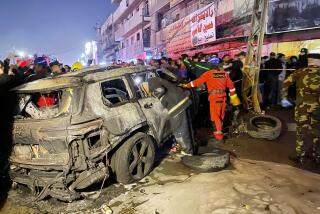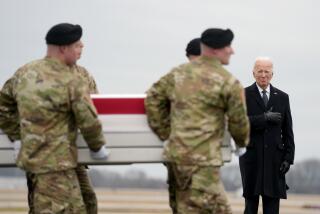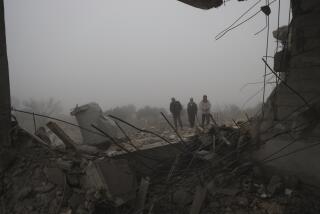Sirens, Booms, a Call to Prayer
First came the deep wail of sirens, mournfully breaking the predawn quiet. Then the bright yellow flashes of antiaircraft fire lighting the sky over the Iraqi capital. Then the insistent shudder of concussions, booming like kettle drums.
It was about 5:30 a.m. today in Baghdad and war had begun.
At about the same time, a larger flash could be seen in the southwest of the city, roughly in the vicinity of Saddam International Airport or the nearby Mansour area. This may have signaled a U.S. cruise missile strike, although it was not clear what, if anything, had been hit.
The first antiaircraft barrage tapered off after a few minutes, just as dawn began to cast a hazy glow over the city. At 5:36 a.m., Iraqi TV came on briefly to announce that a rocket had fallen on the city, then it went off the air again. The moan of sirens was replaced by the somber notes of the Muslim call to prayer, broadcast from mosques throughout the city. The city slowly, cautiously came to life.
Below the rooms of the Al-Rashid Hotel, where many foreign journalists have been staying, buses and cars began to appear on streets that had been still. At about 6 a.m., two ambulances sped along a road that runs along the Tigris River, which bisects the city.
By the time President Bush spoke to the United States, about 45 minutes after the initial sirens, to announce that the attack on Iraq had begun, street lights were flickering off and a few new explosions could be heard in the distance. Flashes of antiaircraft fire could be seen to the south of the city center. State-run TV came back on, this time with old footage of battle scenes, a fairly common sight on Iraqi television, followed by an address by President Saddam Hussein.
Aside from the brief barrage, there was virtually nothing -- aside from a couple of trucks filled with soldiers -- to suggest that Baghdad was a city at war. Iraqis interviewed later in the morning seemed puzzled by the bombardment and unsure about where any missiles might have hit.
“They started it. America will burn in hell for its crimes,” said one man, Hadi Ahmad.
This is a city that is uncommonly familiar with conflict. The first dawn of this war came after a day in which life in the Iraqi capital seemed to go into suspended animation. Streets were eerily empty, store shelves bare and shops shuttered long before the sun went down.
At the Al-Alwiya Maternity Hospital, the grim and fearful mood Wednesday was countered, somewhat, by the promise of the future. But even the hospital was almost deserted, empty halls readied for war wounded. Two unshaven male nurses fussed over tiny newborns.
One, pink and wriggling, lay with his arms splayed out in a polyurethane incubator, the name of his mother, Astra Mohammed, written in ballpoint on the tape that all but covered his tiny, heaving chest.
Only 13 hours old at 1 p.m. Wednesday, the premature, unnamed infant had been left alone at the hospital. His mother had gone home to tend to her other children, and who knew when she would be able to come back for her new son. It was slightly more than 16 hours later that the explosions shook the city.
The little boy -- like three of the four other premature infants who lay in the incubator room with him -- was delivered early by caesarean section because his mother didn’t want to have to go through labor while the bombs were falling, physicians and nurses said.
Ordinarily, about 25 women a day come to the hospital for deliveries. In the preceding 24 hours, only four had come, said head physician Tariq Bayati. Mothers who were due to give birth this week had opted to have their children early through induced labor or C-section, or else they were staying at home and would deliver there, hopefully with the aid of licensed midwives, Bayati said.
“It is not easy to see a woman start to deliver when a war is to begin, so it is not so easy here for the time being,” said the doctor, whose strained face and clipped sentences reflected the general nervousness as Bush’s ultimatum relentlessly counted down.
“Most of our patients have left the hospital due to the circumstances,” Bayati said, adding that women giving birth have been checking out after one or two hours.
It may seem heartless for a mother to leave behind her newborn, but staff members said that with the prospect of 3,000 bombs falling in 48 hours in the opening phase of a U.S.-led attack on Iraq, some parents felt that the hospital would be better able to cope with an infant than they could.
Bayati promised that the hospital staff would not abandon the babies, no matter how terrifying the sound of explosions ringing over the city that is expected to bear the brunt of the onslaught. “We are here to give help, day or night,” he said. “We have to.”
In the nearly empty hospital corridors, still dusty from a sandstorm that swept Baghdad, footsteps echoed and the few remaining staff members looked on anxiously.
Fifteen beds covered with white linen were set up in the hallway. Rusty green oxygen tanks and stands for intravenous tubes were arrayed neatly next to them. A nurse, who would not give his name, said they were there waiting to receive trauma victims.
“We have prepared everything. Beds, medicine, oxygen. We prepared it two months ago, in fact,” he said. “Now it is finally time.”
One woman approached a reporter and said in Arabic, “You could leave. Why are you still here?” And then, in English, her companion said, “Thank you.”
In the ward for premature infants, head nurse Faraj Alwan showed off his young patients -- any of whom could fit into a shoe box -- and said that two of the infants were ready to be discharged but that the hospital had not heard from the parents.
“They were afraid for their families, and so they left the baby with us,” he said.
The Mohammed baby appeared to be the healthiest of the five, active in his incubator, opening his blue eyes slightly and at one point seeming to smile -- but it was only the beginning of a wail heard dully through the plastic.
The only parent around was Hassam Khassem, 33, an Industry Ministry worker, who hadn’t left the hospital in the two days since his son Ali was born. Ali had a purplish skin color and needed extra oxygen to help him breathe. His mother left for home shortly after her difficult labor to care for their other three children, but Khassem said he wouldn’t leave his son alone.
Khassem blamed fear of the war for his wife’s early labor, which was then complicated by bleeding. Ali was born after 36 weeks’ gestation weighing only about 4 pounds.
“For the last three weeks, she was shaking, wondering what to do,” he said. “Then finally, she told me to take her to the hospital because she could not stand the fear.”
The baby still isn’t healthy enough to go home. “Two more days, and he will be fine,” said Alwan, the nurse. “Most of the parents want us to give them their babies, even if they are not ready.”
The nurse railed against an American-led war.
“They are innocents,” he said of the children.
“Why do they kill them? If there is a war, there will be a high percentage lost, and there is nothing worse than to see such tiny, innocent creatures struggling to live. In 1991, we had many losses during the war -- there was no oxygen, no electricity. We could not save them.”
But as the Mohammed baby began to whimper, he brightened. “Crying is a good sign,” he said. “It means it is time to try their feeding.”
More to Read
Start your day right
Sign up for Essential California for news, features and recommendations from the L.A. Times and beyond in your inbox six days a week.
You may occasionally receive promotional content from the Los Angeles Times.






